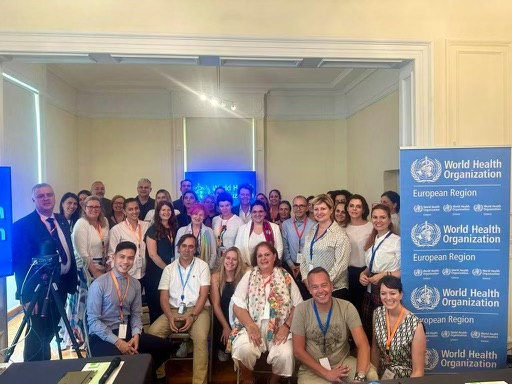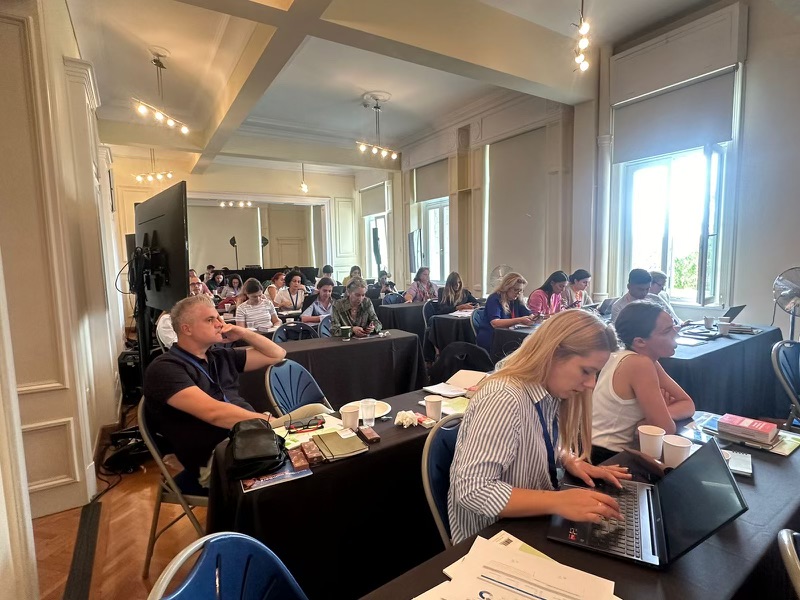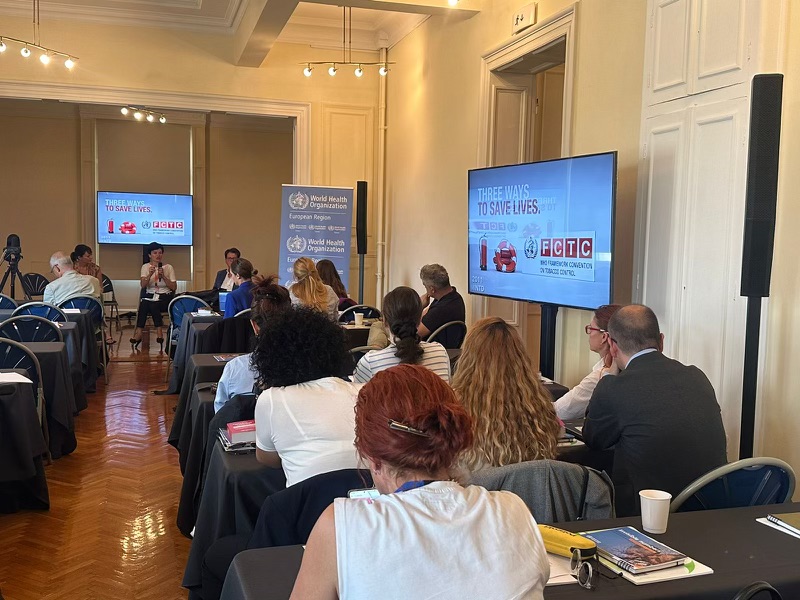
WHO hosted the first ever journalism training on noncommunicable diseases and injuries for the Balkan region in Athens, Greece in October 2023. The three-day Journalism Training brought together 47 journalists from Albania, Bosnia and Herzegovina, Cyprus, Greece, Montenegro and Serbia.
Noncommunicable Diseases (NCDs) like heart disease, diabetes, cancers, respiratory disease and injuries are responsible for 80% of global deaths each year. To see progress in combating the spread of NCDs, it is critical to increase public awareness of the problem and how to prevent these diseases and injuries. Also, prioritizing road safety is essential to save lives and prevent injuries in a world where millions are affected by traffic accidents each year. However, these topics are often underreported and underestimated and in addition, there are also issues around how NCDs are covered in mainstream media: language, consistency in messaging, and an understanding of key underlying issues.
This training aimed to improve the quality and quantity of media coverage on key issues around NCDs and injuries. More specifically, the goal is to help journalists have a clear understanding of the different NCD Diseases and risk factors, understand their role and embrace their responsibility as media to communicate these topics and to learn different angles when covering NCDs and injuries.
As Ivo Rakovac, Special Representative and Officer in Charge at WHO Country Office Greece & Unit Head and Regional Adviser for NCD Surveillance Regional Director’s Special Initiative on NCDs and Innovation points out: “NCDs are causing 90% of deaths and 85% of disability in the WHO European Region. Tackling NCDs requires whole of society approach, and journalists and media play key role in informing public and shaping opinion, including contributing to societal accountability. Therefore, it is important that journalists have comprehensive and unbiased knowledge about NCDs and work with WHO on its dissemination.”
Each day included WHO experts and was supported by journalism networks including: BBC, BIRN, European Solutions Journalism Network, and the World Federation of Science Journalism.
In January 2024 an online follow-up session will take place. WHO announced a global competition for the best article written on the topics of NCDs and Injuries to be awarded in early 2024.
Day 1: Monday, October 16, 2023: Introduction to NCDs and different types of journalism to support public understanding on NCDs

The training commenced with a welcoming session featuring prominent speakers, including Joao Joaquim Rodrigues da Silva Breda, Head of WHO Quality of Care Athens Office and Special Representative of the Regional Director, and Ivo Rakovac, Special Representative and Officer in Charge at WHO Country Office Greece & Unit Head and Regional Adviser for NCD Surveillance Regional Director’s Special Initiative on NCDs and Innovation. They emphasized the public health significance of NCDs. The day included a panel discussion on the media's role in NCD awareness, and a presentation on effective communication around diet-related diseases by Christoffer van Tulleken, Associate Professor at UCL and BBC/CBBC Television Presenter. Workshops on storytelling techniques and solutions journalism were conducted.
Day 2: Tuesday October 17, 2023: WHO campaigns, Road Safety, Tobacco

The second day began with a presentation on the importance of road safety by Nhan Tran, Unit Head, Safety and Mobility, World Health Organization, followed by a panel discussion on WHO tobacco control campaigns, industry interference, and social media, featuring Douglas Bettcher, Special Advisor to the Director-General at WHO, and Mina Brajovic, World Health Organization Head of Country Office, Montenegro. Investigative journalism in tackling the tobacco epidemic was discussed in a presentation by Tasos Telloglou, Journalist at InsideStory, followed by a fireside chat on tobacco cessation. Other sessions included discussing the harms from alcohol in the media and the day also involved a workshop on pitching stories to editors with Besar Likmeta, Albania Editor in Chief at Balkan Investigative Reporting Network (BIRN). The day concluded with a panel discussion reflecting on the training's impact and future journalistic endeavors.
Day 3: Wednesday October 18, 2023: Health Initiatives in Greece
The final day, revolved around health initiatives in Greece with Greek journalists. It began with a panel discussion on “Hypertension in Europe: the case of Greece,” featuring Leanne Riley, Unit Head at Surveillance, Monitoring, and Reporting, Communicable, and Joao Joaquim Rodrigues da Silva Breda, Head of WHO Quality of Care Athens Office. The day continued with informative presentations on obesity, examining the issue at global, European, and national levels for all age groups. A panel discussion on overdose prevention involved experts like Daliah Heller, Vice President of Drug Use Initiatives at Vital Strategies, Isabelle Giraudon, Principal Scientific Analyst at the Public Health Unit, EMCDDA, and Angelos Hatzakis, Professor Emeritus of Epidemiology and Preventive Medicine at the National and Kapodistrian University of Athens Medical School.
The day concluded with a field trip to the WHO Quality of Care Athens Office, providing participants with a unique firsthand experience of the office's work. They gained valuable insights into local initiatives related to quality of care and mental health, offering a practical perspective on healthcare efforts in Greece.
For more information on this training please contact: botsioua@who.int
Images: © WHO
